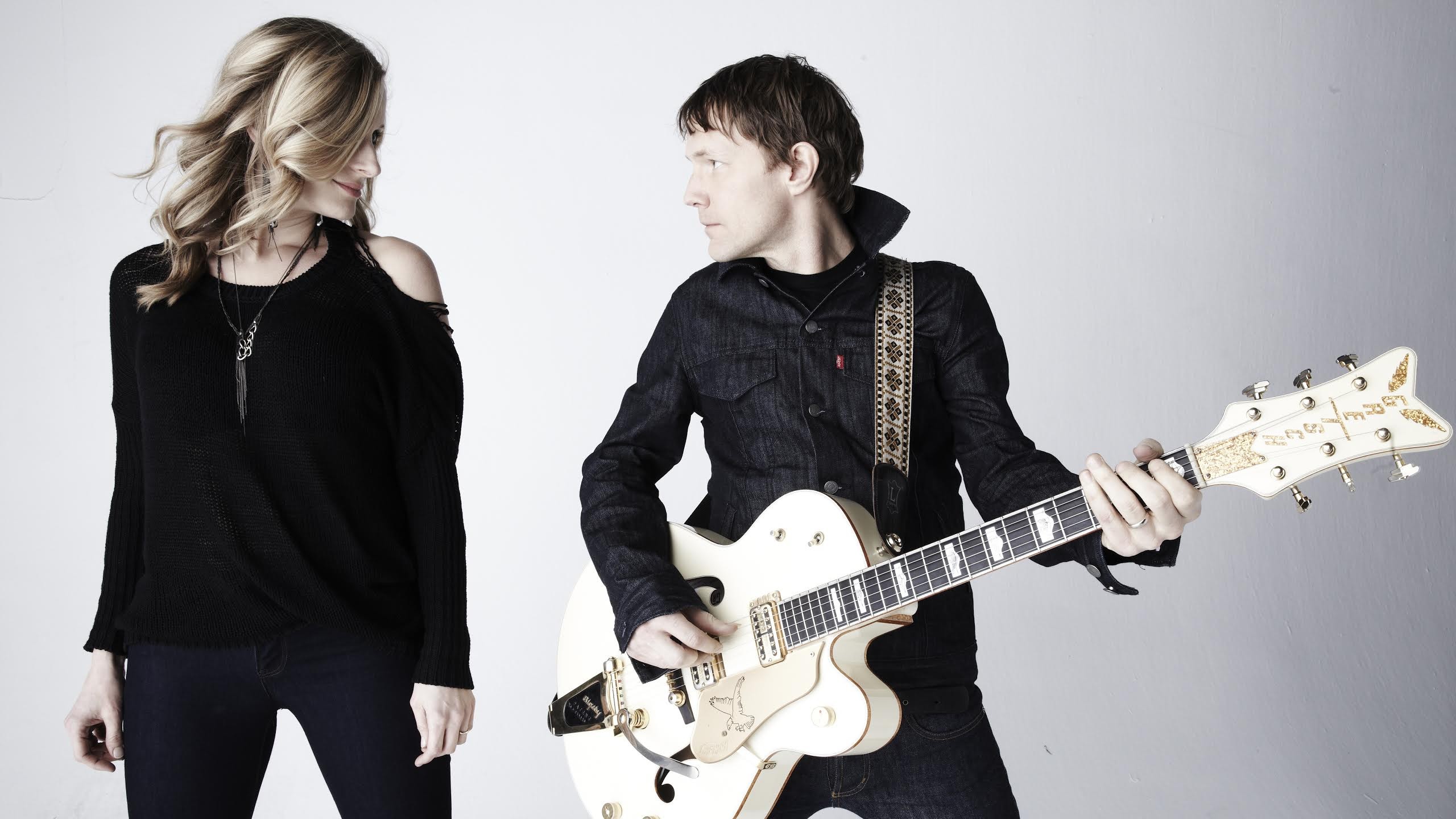
It has often been said that being in a band is akin to being married. For Luke Doucet and Melissa McClelland of Whitehorse, this is actually the case. The pair, who was married in 2006, put their respective careers on hold to form Whitehorse in 2011. “The fact that we play music together is what enables us to BE together,” Doucet says. “We’re both musicians and if we weren’t playing together we’d be apart all the time. I know a lot of musicians and it’s challenging to be on the road all the time when your better half is at home.”
Of course it helps that the pair works so well together: they both sing, they both write and they both play many instruments. “The obvious advantages, musically, are that we spend so much time together that we understand each other on an intrinsic kind of level where sometimes things don’t have to be said, you know?” This connection greatly facilitates the songwriting process in Doucet’s mind. “In a lot of artistic partnerships, there’s a certain amount of translation that has to be done, where you have to describe where you’re hoping this is gonna go, or where it came from”, he explains. “I think that in the case of Melissa and myself, we have a pretty innate understanding of what that is.”
This partnership is at the heart of what makes Whitehorse what it is, and the songs are written knowing they’ll be told by two people. “We’re definitely conscious of the fact that the protagonist is not always simply one person, and that the perspective we’re trying to share is two-fold,” he explains. “And sometimes that means that the two perspectives are conversing. We didn’t start the band by saying ‘hey, let’s write a bunch of songs that tell two stories’ but I guess the law of unintended consequences produces those kind of outcomes.”
This album is the pair’s third as Whitehorse, but both of them have released many albums before, so while there was some pressure on them to deliver after the success of the first two (“The Fate of the World Depends on This Kiss” was even nominated for a Polaris music prize), the process was quite natural for both of them. The band set up a Kickstarter campaign that raised 270% of its 10,000$ goal, so clearly fans were looking forward to a new album. With a 6-month-old baby quietly cooing in his lap while we speak, it’s obvious that the couple are going through some pretty interesting times as parents, and that bleeds into their creative life. “We started writing bright, happy, major key songs when we started this record,” Doucet recalls. “And then Gus Van Go, who was our producer (a Montrealer who used to front the band Me, Mom and Morgentaler in the late ’80s), heard the songs and he said ‘No’. He said ‘I like Whitehorse the way it is. It’s dark and I want to keep it dark.'” The duo then scrapped the songs and went back to the writing board to write material that stayed true to Whitehorse. I wondered if they had plans for those rejected happy songs. “No,” says Doucet. “But we have a new baby, so maybe they’ll end up as lullabies!”

Many songs on “Leave No Bridge Unburned” evoke Southern textures that recall the aesthetics of Spaghetti Western films, but Doucet says they come at it from a different angle. “The approach we take to songwriting is to try and use a lot of space. I use a lot of reverb on my guitar: I like the guitar sounds that come from the ’50s and ’60s. Put those ingredients together, and I guess they end up sounding like they belong in the Southwest. It’s funny; people keep asking us about that influence, and I’m still scratching my head a little bit because I don’t feel we’ve departed from where we were on the last album.”
This textured approach to songwriting is a major factor in the Whitehorse sound. “I’ve always valued the spaces between the notes more than the notes themselves,” Doucet says. “And I think that when you spend lot of time listening to those spaces between the notes, it tends to be evocative of a certain time and a certain place, and maybe Spaghetti Western is that time and place.”
The pair’s complicity is also essential to their song writing. “What happens is one of us will write a song and present it to the other. In some cases, that’s it: it’s beautiful, it’s done! In other cases, we’ll pick at it, and that’s where the co-writing will happen with us. The initial germ of the song is usually not a co-writing situation; it’s usually my song or Melissa’s song. But having said that, we do co-write a lot, but that’s because we end up reworking each other’s music a little bit. Sometimes it’s because we feel the songs are not complete, but most of the time it’s more ‘let’s work at this together so we can improve each other’. And those are two very different goals obviously. And I think that with Whitehorse being a band about two specific voices, it’s really important that the song not simply be reflective of one perspective. We’re really making an effort to tell parallel stories, so we often take each other’s songs and try to make them about two people instead of about one.”
On the topic of musical influences, Luke Doucet has an interesting point of view. “I don’t think we choose our musical influences,” he says. “If you were to ask me which artists I’d like people to think were my influences, I would say ‘John Lennon, Beck, Elliot Smith, Stevie Wonder.’ I could come up with all kinds of people I would like to be described as. But I think the reality is that we’re influenced by everything that we hear. If I’m walking down the street and I hear a pop song coming out of somebody’s car stereo, I will be influenced by that. It doesn’t necessarily mean I’m going to try and copy it; in fact it might mean that I’ll go out of my way to NOT do something. Maybe I’ll be influenced in a negative way: don’t do that, that’s terrible. Melissa was just saying that everything between Beyoncé and Beck is probably the reality for us.”
Still, some of their musical interests aren’t surprising once you’ve heard the music they make together. “We like blues, and we like old country music and that’s genuine. When we’re at home, we listen to lots of different stuff, but we don’t listen to a lot of heavy metal or R&B. The type of music we like is probably fairly predictable by our records. I tend to listen to a lot of one thing, and I guess Melissa’s the same way. This month we’ll listen to a lot of Calexico, next month we’ll listen to a lot of Beck, and after that early 70’s Rolling Stones, and…” Doucet’s thoughts trail off and he suddenly has a flash. “I don’t know. Tom Waits! I love Tom Waits!” he jokingly exclaims. “The long answer to your question is everything I’ve just said, the short answer is: Tom Waits!”
Their single “Downtown” finds its origins in Doucet’s fascination with the modern metropolis. “I think that cities might be the greatest of our accomplishments. You take millions of people and you put them in one place together. For the most part they tend to get along: they create art, politics, culture, food, architecture, dance and what have you.” This fascination goes back to his early childhood, growing up in Halifax. “I’ve been mesmerized by cities since I was a little kid. When I was six years old, sometimes I would miss the bus going to school in the morning and, because I went to a french immersion school that was located two miles away, I would walk across the entire city of Halifax, by myself. The thought of being alone in a city, and the anonymity it provides, is something I’ve always valued.”
Recent political shenanigans also served as inspiration. “I know Montreal has had its share of drama with municipal politics and mayors, but in Toronto, the whole Rob Ford debacle was interesting for us, because I think it was the end of the innocence in a lot of ways,” he says. “You see the division between urban and suburban living in American culture and it’s very stark. Suburbs tend to be very conservative; the cities tend to be liberal. And there’s not a lot of love between the two; there’s a lot of disdain and a lot of distance. I was under the impression, naively, that in Canada it wasn’t so much like that. But when the whole Rob Ford bullshit came to the foreground in the media, what I learned is that it is every bit as bad as our American cousins. The Rob Ford story is very much a story about the suburbs versus the city. And there was a lot of acrimony, antipathy and hatred between the suburbs and what they perceived to be urban elite. I wouldn’t say that “Downtown” tells that story necessarily, but I think those themes of what it means, the relationship that you have between you life, your personality, your soul, and where you live, is very important.
The pair came up with the concept for the video themselves, with help from Gus Van Go. “The idea was that we were being chased, but it was unclear who was chasing us. It was important to us that our nemesis was undefined. And then Gus had the idea that, at the end of the video, Melissa and I would be playing music and then our alter egos would meet up with us and we would play music together. So the concept was really a combination of Melissa, myself and Gus.”
Whitehorse’s reputation as a great live band precedes them, and I asked Luke what makes their shows so special. “There’s a great potential for train wrecks in our live show; it’s very common for us to go off the rails,” he admits with a laugh. “There’s just two of us in the band and yet we play a lot of instruments. We play drums, bass, keys, percussion and guitars. And we use loops but in a way that might be unorthodox: Melissa is the engineer and operates the looping machine, and I’ll play drums. We’ll record drum passages and she’ll play bass, I’ll switch to guitar and she’ll switch to keyboards. A lot of people who use technology in pop music, whether it’s using loops or playing to sequencers, there’s not much risk involved because there’s a safety valve. If something goes wrong, you can have a spare loop in backup on your machine and push a button and it plays a perfect loop. We have no safety technology. If I play a shitty drum pass, cause I’m not a drummer, and Melissa records it and it comes out not perfect, that’s how it’s gonna go, and that’s how the song is gonna sound that night. If we try and it’s really terrible, we’ll stop it. We’ll stop the song in the middle and say ‘Sorry we gotta try this again, that’s just too horrible.’ But when it goes well, it’s really spectacular. And when it doesn’t work, the train wreck is equally spectacular.”
Whitehorse will play the Montréal en Lumière festival on February 21 2015 at L’Astral. Tickets can be purchased here. The album “Leave No Bridge Unburned” is out now and we reviewed it here. Jean-Frederic Vachon is the brains behind the blog Diary of a Music Addict.




